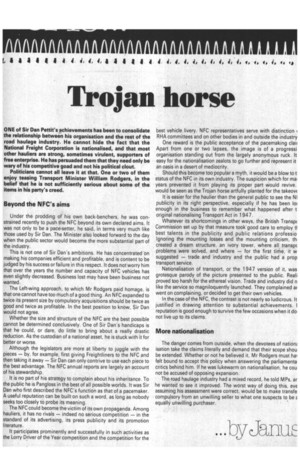Trojan horse
Page 58

If you've noticed an error in this article please click here to report it so we can fix it.
ONE of Sir Dan Pettit's achievements has been to consolidate the relationship between his organisation and the rest of the road haulage industry. He cannot hide the fact that the National Freight Corporation is nationalised, and that most other hauliers are strong, sometimes virulent, supporters of free enterprise. He has persuaded them that they need only be wary of his competitive goad and not his political clout.
Politicians cannot all leave it at that. One or two of them enjoy teasing Transport Minister William Rodgers, in the belief that he is not sufficiently serious about some of the items in his party's creed.
Beyond the NFC's aims
Under the prodding of his own back-benchers, he was constrained recently to push the NFC beyond its own declared aims. It was not only to be a pace-setter, he said, in terms very much like those used by Sir Dan. The Minister also looked forward to the day when the public sector would become the more substantial part of the industry.
This is not one of Sir Dan's ambitions. He has concentrated on making his companies efficient and profitable, and is content to be judged by his success or failure in this respect. It does not worry him that over the years the number and capacity of NFC vehicles has even slightly decreased. Business lost may have been business not wanted.
The Left-wing approach, to which Mr Rodgers paid homage, is that one cannot have too much of a good thing. An NFC expanded to twice its present size by compulsory acquisitions should be twice as good and twice as profitable. In the best position to know, Sir Dan would not agree.
Whether the size and structure of the NFC are the best possible cannot be determined conclusively. One of Sir Dan's handicaps is that he could, or dare, do little to bring about a really drastic reduction. As the custodian of a national asset, he is stuck with it for better or worse.
Although the legislators are more at liberty to juggle with the pieces — by, for example, first giving Freightliners to the NFC and then taking it away — Sir Dan can only contrive to use each piece to the best advantage. The NFC annual reports are largely an account of his stewardship.
It is no part of his strategy to complain about his inheritance. To the public he is Pangloss in the best of all possible worlds. It was Sir Dan who first described the NFC's function as that of a pacemaker. A useful reputation can be built on such a word, as long as nobody seeks too closely to probe its meaning.
The NEC could become the victim of its own propaganda. Among hauliers, it has no rivals — indeed no serious competition — in the standard of its advertising, its press publicity and itS promotion literature.
It participates prominently and successfully in such activities as the Lorry Driver of the Year competition and the competition for the best vehicle livery. NFC representatives serve with distinction RHA committees and on other bodies in and outside the industry One reward is the public acceptance of the pacemaking claii Apart from one or two lapses, the image is of a progressi organisation standing out from the largely anonymous ruck. It easy for the nationalisation zealots to go further and represent it an oasis in a desert of mediocrity.
Should this become too popular a myth, it would be a blow to t status of the NFC in its own industry. The suspicion which for mai years prevented it from playing its proper part would revive.
would be seen as the Trojan horse artfully planted for the takeovE It is easier for the haulier than the general public to see the NI publicity in its right perspective, especially if he has been loi enough in the business to remember what happened after t original nationalising Transport Act in 1947.
Whatever its shortcomings in other ways, the British Transpc Commission set up by that measure took good care to employ tl best talents in the publicity and public relations professio Ignoring the mounting losses and the mounting criticism, thv created a dream structure, an ivory tower, where all transpc problems were solved, and where — for the first time, it w suggested — trade and industry and the public had a prop transport service.
Nationalisation of transport, or the 1947 version of it, was grotesque parody of the picture presented to the public. Reali proved too harsh for the ethereal vision. Trade and industry did n like the service so magniloquently launched, They complained ar went on complaining, or decided to get their own vehicles.
In the case of the NFC, the contrast is not nearly so ludicrous. It justified in drawing attention to substantial achievements. I reputation is good enough to survive the few occasions when it dol not live up to its claims.
More nationalisation
The danger comes from outside, when the devotees of nationi isation take the claims literally and demand that their scope shou be extended. Whether or not he believed it, Mr Rodgers must ha) felt bound to accept this policy when answering the parliamenta critics behind him. If he was lukewarm on nationalisation, he cou not be accused of opposing expansion.
The road haulage industry had a mixed record, he told MPs. ar he wanted to see it improved. The worst way of doing this, eve assuming his assessment were correct, would be to make transfe compulsory from an unwilling seller to what one suspects to be z. equally unwilling purchaser.




































































































